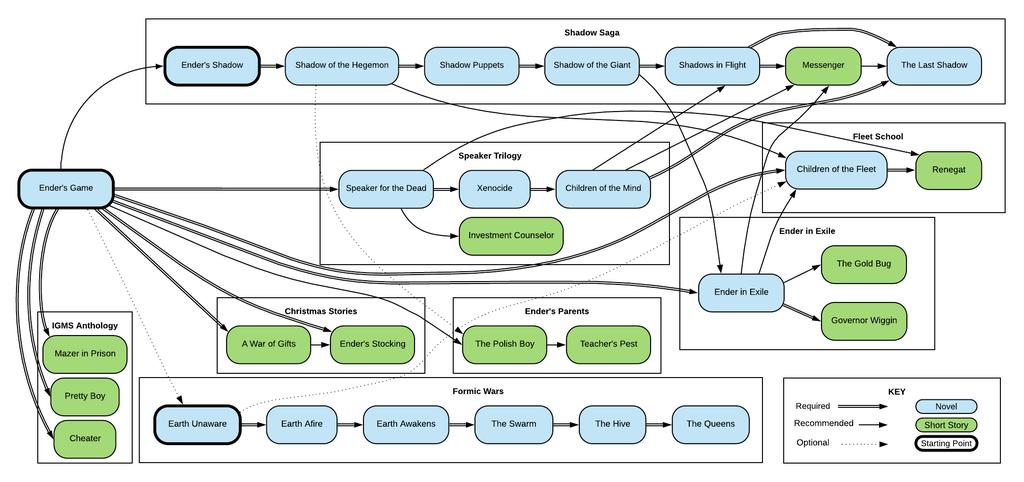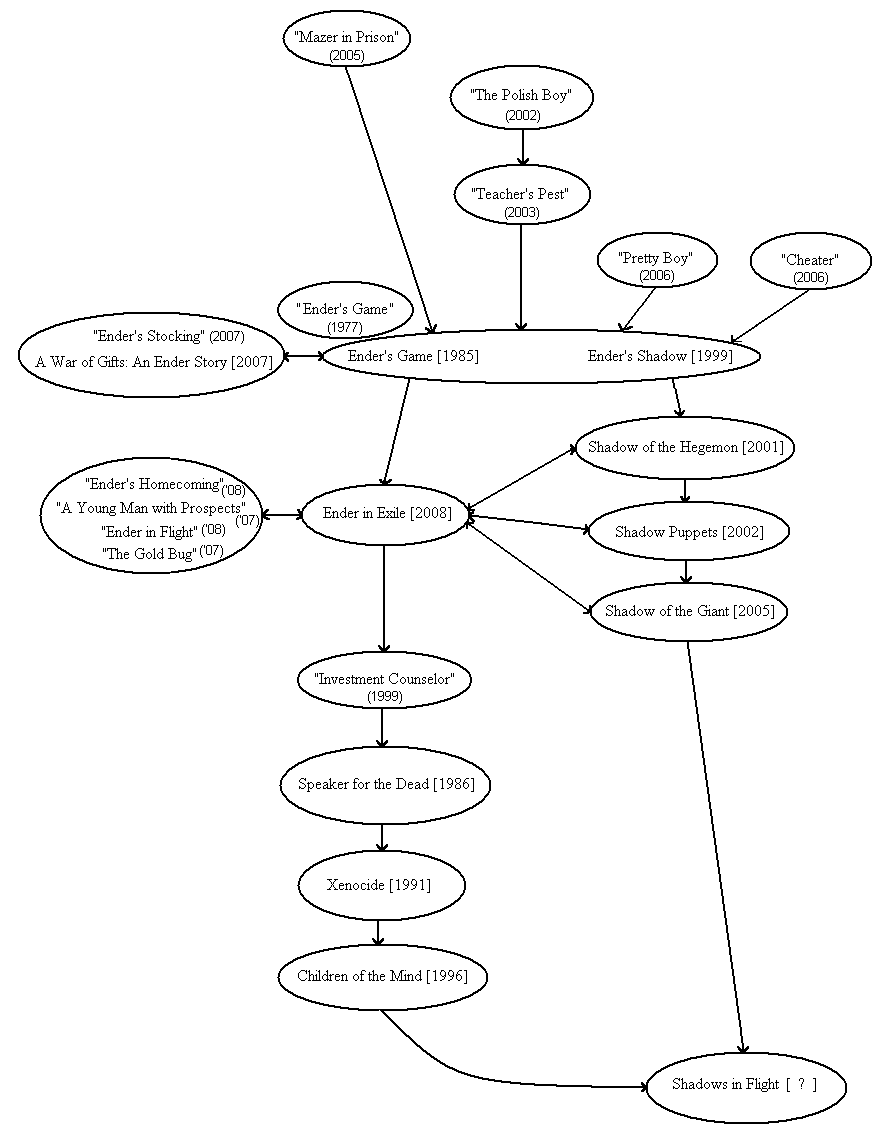UPDATED WITH NEW CHART, SHOULD BE ACCURATE AS OF 2020
In general, the books assume that you've read everything previously released. The nomenclature also evolved throughout the series, and going out of publication order will lessen one's reading experience. This doesn't matter as much regarding the short stories, but should ideally be followed regarding the main books.
The below chart I made shows which books should be read before every other book.

It should be stressed that pretty much every book in the series has a wildly different tone and style. Liking (or disliking) one book doesn't mean you'll like or dislike a different one. If you find you don't like what you're reading just put it down and jump to a different section.
Ender's Game was the first book, and is by far the most famous. It's definitely the recommended place to begin reading. That said, Ender's Shadow and Earth Unawares can each function as a starting point on their own.
Speaker for the Dead trilogy
- Speaker for the Dead
- Xenocide
- Children of the Mind
- Investment Counselor (short story)
This is the original sequel to Ender's Game, though there is a 3,000 year time gap, and the books have a pretty different tone and cast of characters. The short story "Investment Counselor" can be read right after Speaker.
Shadow Saga
- Ender's Shadow
- Shadow of the Hegemon
- Shadow Puppets
- Shadow of the Giant
- Shadows in Flight
- Messenger (short story)
- The Last Shadow (TBA)
Ender's Shadow is a parallel novel to Ender's Game, and tells much of the same events from Bean's point of view. It can actually be read prior to Ender's Game, though it's better afterwards. Hegemon, Puppets, and Giant form a trilogy set on Earth following up on a lot of the characters from Ender's Game and Ender's Shadow. It's a geopolitical thriller like a big game of risk.
There are two open plot threads at the end of Shadow of the Giant. One of those is followed in Shadows in Flight, the other is addressed in Ender in Exile. Messenger and (upcoming) The Last Shadow follow up on both Shadows in Flight and Children of the Mind, while also mixing in some elements from Ender in Exile.
Ender in Exile
- Ender in Exile
- The Gold Bug (short story)
- Governor Wiggin (short story)
Ender in Exile is a very much expanded version and continuation of the last two chapters of Ender's Game. The book also wraps up and spoils some of the plot from Shadow of the Giant, so it is recommended you read that one first. There are a few short stories that overlap with Ender in Exile, but most of them are completely included inside the book itself and therefore not worth reading independently. The exception is "The Gold Bug", which has a long intro not included in the book. "Governor Wiggin" is a short story Card wrote several years later, which is set during the same time period of Exile and should be read afterwards.
Formic Wars
- Earth Unaware
- Earth Afire
- Earth Awakens
- The Swarm
- The Hive
- The Queens (TBA)
- Third trilogy (TBA)
These six books are prequels and cover the first and second invasion. These are not written by Orson Scott Card, but by his friend and collaborator Aaron Johnston. (Card serves as more of an advisory role and helps work out the plot.) Johnston has said that he plans to write a third trilogy after the second is finished which will continue following the characters in those books.
Fleet School
- Children of the Fleet
- Renegat (short story)
This book follows a new character and is largely set in Battle School after the events of Ender's Game. It was written as a tie-in to a video game which never ended up happening, and thus it isn't very likely for Card to write more books with the character. Children of the Fleet also involves some plot elements from Shadow of the Hegemon and Ender in Exile, and so should only be read after those two books. It also has some minor worldbuilding elements from the Formic Wars books, but should be understandable without. The short story "Renegat" continues the character many years later, but should not be read until after Speaker for the Dead.
Short Stories
- The Polish Boy (after Shadow of the Hegemon)
- Teacher's Pest (after The Polish Boy)
- A War of the Gifts
- Ender's Stocking
- Mazer in Prison
- Pretty Boy
- Cheater
"The Polish Boy" and "Teacher's Pest" are about Ender's parents and should best be read after their characters get expanded in Shadow of the Hegemon. A War of Gifts and Ender's Stocking have some overlap, and are both Christmas stories. The remaining three can be read anywhere in any order, and just give some prequel backgrounds to three characters from Ender's Game.
Orson Scott Card's official answer (as of 2009, so not covering Formic Wars and Fleet School) is to pretty similar to this. He recommends publication order for the novels, but advises younger readers to push off reading the Speaker trilogy. He says to hold off on the short stories until after Ender's Game.
Full quote follows (in spoiler text cause this answer is already long and some devices truncate unopened spoiler text blocks.)
The "preferred order" depends on what you mean by "preferred," and who's doing the preferring.
There are two main story threads. One begins with Ender's Game, and proceeds to Ender in Exile (which overlaps with EG) and then on to Speaker for the Dead, Xenocide, and Children of the Mind.
The other story thread begins with Ender's Shadow (which is parallel to Ender's Game), and proceeds to Shadow of the Hegemon, Shadow Puppets, and Shadow of the Giant. Eventually the two threads come together with the book Shadows in Flight.
The short stories make things even more complicated. They should NOT be read in chronological order because even though many are prequels, they only take on their full significance if you have already read either EG or ES.
The Polish Boy and Theresa (in First Meetings) are the stories of Ender's parents - who they are and how they meet. Mazer in Prison (IGMS) is the story of Mazer Rackham's recruitment by Graff to be part of the training of the future commander of the fleeet.
The stories Cheater and Pretty Boy are the stories of Han Tzu (Hot Soup) and Bonzo Madrid when they were children on Earth, before going to Battle School.
Goldbug (standalone comic and IGMS story) takes place on the first world Ender goes to, where he discovers the hive queen. It slides into the middle of Ender in Exile ... somewhere ...
Investment Counselor (First Meetings) takes place after EG and Ender in Exile, and before Speaker for the Dead.
The story War of Gifts (a novella) takes place in the midst of Ender's Game - sort of a side story. It can stand alone. There is also an IGMS story called Ender's Stocking that overlaps with War of Gifts but focuses on a crucial time in Peter's life.
The stories A Young Man With Prospects and Ender in Flight are both part of Ender in Exile, so if you've read that novel, you've read those stories.
You can read the novels in the order of composition: Ender's Game, Speaker for the Dead, Xenocide, Children of the Mind, Ender's Shadow, Shadow of the Hegemon, Shadow Puppets, Shadow of the Giant, and Ender in Exile. (This poses the challenge for younger readers of the very talky, philosophical and adult Speaker, Xenocide, and Children of the Mind.)
You can read the novels as two separate threads in sequence. For younger readers, the best plan is to read Ender's Game and Ender's Shadow in any order, and then proceed through the Shadow books and then all the shorter works, saving Speaker, Xenocide, and Children of the Mind until you're older.
Or you can struggle to read them in chronological order of the story, as described above.
Then again, the Empire books, the Homecoming series, and the Alvin Maker books are absolutely in chronological order and are very clear. They have nothing to do with Ender Wiggin or Julian "Bean" Delphiki, but at least you know what order they're in!
Comics
I know, the question seemed to be focused on the written works, but I thought I may as well cover the comics too. The comics were made after the books were already written, and so the publication order doesn't really matter. For the Comics, I would go with a modified chronological order starting with Ender's Game. Note that Ender's Shadow arc isn't necessary for understanding any of the other comics.
- Ender's Game: Battle School
- Recruiting Valentine2
- Ender's Game: Command School
- Ender's Shadow: Battle School
- Ender's Shadow: Command School
- War of Gifts2
- The League War2
- Mazer in Prison2
- Ender in Exile
- Gold Bug2
- Speaker for the Dead
- Formic Wars: Burning Earth
- Formic Wars: Silent Strike
2These are one-shots and can easily be skipped.


